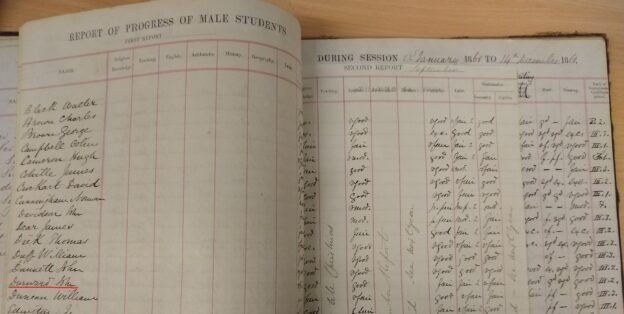Enquiries are very much central to what we do. As well as helping others with their own research, enquiries are often the means by which we learn something new about our own collections. Recently we received one about a (potential) former student, John Macleod Durward, who was recorded in the 1861 as being a Queen’s Scholar.
Newspaper accounts supplied by the enquirer also listed John as having received received various class prizes at the University in 1864 and 1865, including in Moral Philosophy, Rhetoric and English Literature and Mathematics, along with him being from Arbroath. However, we were unable to find him amongst our graduates and the term Queen’s Scholar seemed to have no relation with the University (our initial investigations only uncovered it as something relating to Westminster School).
Nevertheless we persitsed as John had clearly been at the University and we should have some record of him. We discovered that he had in fact matriculated in Arts for the academic years 1863/4 and 1864/5. So, this all tiednicely with the newspaper accounts but what about Queen’s Scholar?
Our colleages at the UK National Archives proved to be a vital part of our deliberations. Their online guide to records of Teacher Training states:
“At 18 pupil-teachers could apply for the Queen’s/King’s Scholarship Examination (later the Preliminary Examination for the Certificate). Successful scholars had the opportunity of attending training colleges for two or three years.”
The University of Edinburgh did not offer teacher training in this period but there were two institutions in Edinburgh which did, the Church of Scotland Training College and the Free Church of Scotland Training College. Both were forerunners to Moray House College/Institute, which is now part of the University but then were independent entities.
While the student records for the latter for this period have not survived, those for the former have. Would we be lucky? As you can see from the image below, we were.

Church of Scotland Training College: Report on Progress of Male Students
This places John at the Church of Scotland Training College in 1861 (the year he appeared on the census as Queen’s Scholar). John then attended the University for two years immediately after undertaking his teacher training.
